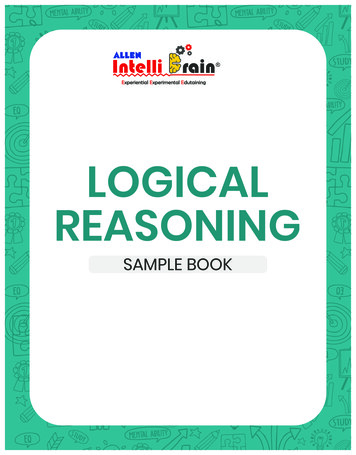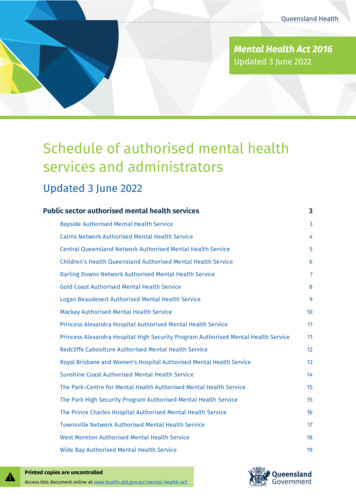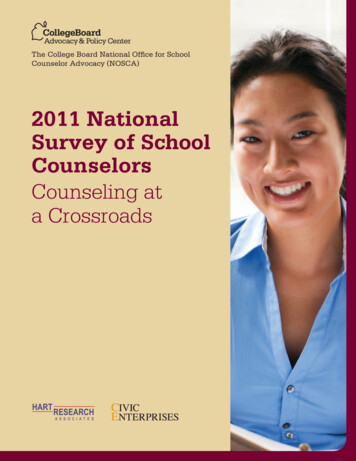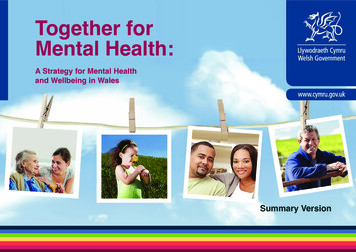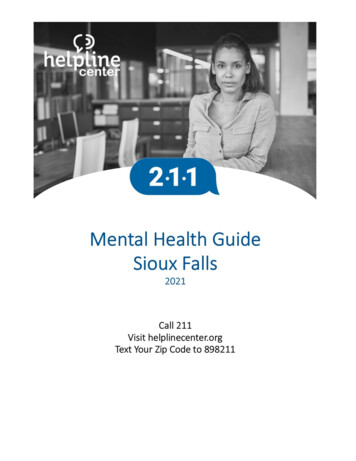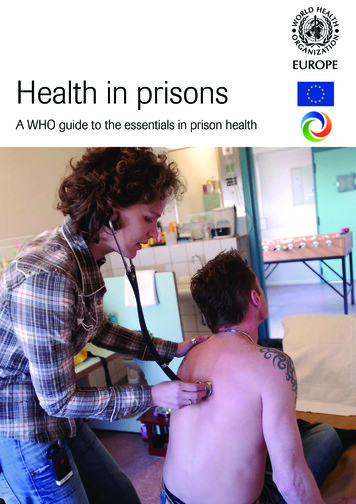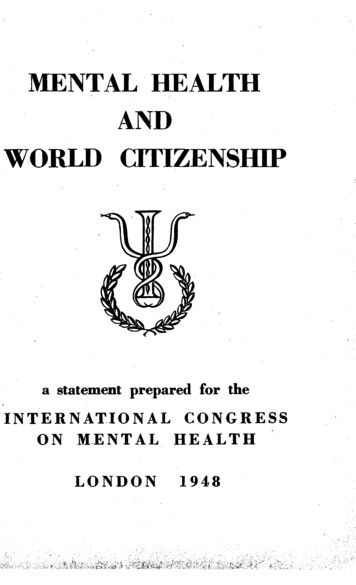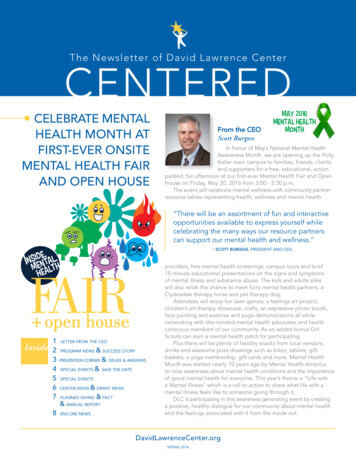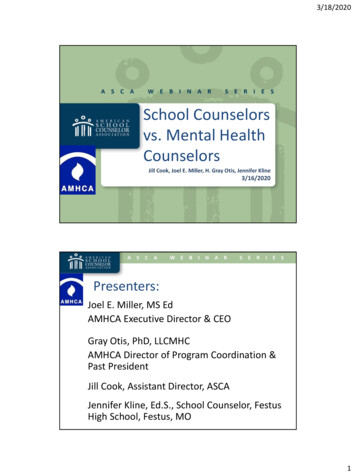
Transcription
3/18/2020School Counselorsvs. Mental HealthCounselorsJill Cook, Joel E. Miller, H. Gray Otis, Jennifer Kline3/16/2020Presenters:Joel E. Miller, MS EdAMHCA Executive Director & CEOGray Otis, PhD, LLCMHCAMHCA Director of Program Coordination &Past PresidentJill Cook, Assistant Director, ASCAJennifer Kline, Ed.S., School Counselor, FestusHigh School, Festus, MO1
3/18/2020Learning outcomes:After viewing this webinar you should be able to: Identify the unique role of school counselors andmental health counselors in addressing students’mental health needs. Describe how to address the mental health needs ofstudents appropriately depending on your role andexpertise. Identify best practices for schools to follow toprotect the mental health and safety of all students.2
3/18/2020Why School Counselors?To Build Better Humans3
3/18/2020A Multi-Tiered ApproachMitigation & PreventionTier 3IntensiveRecoveryTier 2PreparednessTargetedTier 1UniversalResponse4
3/18/2020Specialized Instructional Support PersonnelSchool CounselorsSpecialized knowledge ofcurriculum and instructionSchoolSchool SocialPsychologistsWorkersAbility to administer, analyzeUnderstanding of school,and interpret psychologicalfamily and communityand psycho-educationalsystemsassessments.Design and implementcomprehensive programs tohelp all students buildfundamental academic andsocial/emotional skillsSelect and implementLink students and familiesappropriate, evidence-based with appropriate communityspecialized interventionsservicesPrepare all students forsuccessful transitions fromschool to post-secondaryPromote success fortargeted students withparticular needsFacilitate services fortargeted students withparticular needs5
3/18/2020The Continuum of CareAll School-Employed Mental HealthProfessionalsSchool-BasedPrevention &UniversalInterventionsIdentification ofStudents withMental Health &BehavioralConcernsAll StudentsMost SchoolEmployed MentalHealthProfessionalsTargeted SchoolbasedInterventions withCommunitySupportSome School-Employed MentalHealth ProfessionalsIntensive SchoolIntensivebasedCommunityInterventions withbasedCommunityInterventions withSupportSchool SupportAt-Risk StudentsStudents with Severe/ChronicProblemsPractices in Mental Health SupportCollaboration & ConsultationMental Health Referral Referral for mentalhealth servicesIdentify resources incommunityBuilding connectionsand partnershipsLocate resourceboards (if available) Release from parents to talk to health care providersReinforce coping skills & treatment goalsTransition plan back into theschoolStudent First MindsetKeep the focus on thestudents needsContinue the connectionbeyond the therapysession generalizedinto theenvironment6
3/18/2020BarriersAccess FinancialIdeal Timing of CareLimited number of providersTransportation to servicesTimeliness of appointmentsand openingsLocation of services Time of day of care – missingschoolIn school services are not alwaysappropriateConsistency of receiving servicesStudents resist services due tofear of academic failure orinability to participate inextracurriculars Inpatient is expensiveHospitalization is expensiveLack of health insuranceSome services require somuch parental involvementthat they are at risk oflosing their jobsJoel E. Miller, MS. Ed.AMHCA Executive Director & CEO7
3/18/2020Who is AMHCA? Founded in 1976 Only professional association working exclusivelyfor clinical mental health counselors. 1998 – The first AMHCA Code of Ethics andStandards for the Practice of Clinical Mental HealthCounseling were adopted. 2012 – AMHCA launched advanced practicecredentials (Diplomate and Clinical Mental HealthSpecialist).AMHCA’s Vision“To position clinical mental health counsellorsto meet the health care needs of those we servewhile advancing the profession.”8
3/18/2020Our MissionTo advance the profession of clinical mental health counselling by setting the standard for:CollaborationAdvocacyResearchEthical PracticeEducation, Training, andProfessional DevelopmentLicensed Clinical Mental Health Counselors (LCMHCs) Licensed in all 50 states to assess, diagnose, and treat mental,emotional, and behavioural disorders Various state license titles (e.g. LCMHC, LMHC, LPC, LCPC) 60 credit hour master’s degree Typically complete post-graduate 3000 hours of supervised practice Holistic Focus on total health wellness and development across thelifespan that considers biological, psychological, and social factors Employed in various settings across the continuum of care,including health promotion, addiction recovery services, crisisservices, telehealth, etc.9
3/18/2020140,000 Mental Health Counselors Around the Country10
3/18/2020Gray Otis, PhD, LCMHCAMHCA Director of Program CoordinationFrom “The ASCA School Counseling Model”ESSENTIALS OF THEClinical Mental Health Counseling Profession11
3/18/2020Licensed Clinical Mental Health Counselors (LCMHCs)LCMHCs: Serve as Primary Mental Healthcare Providers Offer integrative, cost-effective services for students with Tier 3 concerns Promote wellness and human development through personalempowerment Resolve the complex roots of each individual client's unique struggles Trained to treat their patients in a holistic manner Work in tandem with school counselors, primary care providers, parents,etc.LCMHC Capabilities Support individuals, couples and families through difficult life experiences, Teach skills and attitudes needed to bring about behavior change. Trained to resolve Anger management Depression and anxiety disorders Suicide ideation Parenting concerns Relational problems and sexuality questions Substance use and compulsive behavioral patterns (e.g. gaming)Uniquely trained to address co-occurring disorders (e.g. trauma anddepression)12
3/18/2020The Practice of Clinical Mental Health Counseling Use a variety of techniques such as CBT Teach people new ways to solve problems and react to “stressors” Offer group therapy and psychoeducational prevention classes See a variety of clients but often specialize (e.g. adolescentcounseling, trauma resolution, behavioral compulsions, etc.) Work in a multidisciplinary care team that may include physicians,psychiatrists, nurse practitioners, psychologists, social workers, casemanagers, etc. Focus on integrated health and resilience developmentAddressing Access Barriers to Behavioral Health ServicesLCMHCs Overcome Barriers to Quality Care: Recognize limitations for School Counselors to deal with Tier 3concerns Provide additional behavioral health resources to students andparents Can monitor medical compliance (prescriptions, lifestyle choices,etc.) Understand resource barriers (e.g., transportation, affordability, etc.) Address the paradox of uniqueness and commonality Decrease stigma through normalization and explanation13
3/18/2020LCMHC Resources for School CounselorsSchool Districts hire or contract for behavioral health servicesLCMHCs Roles: Provide consulting for school counselors Receive referrals from schools to provide Tier 3 student counseling Offer counseling to parents Coordinate with other health care professionals Report back to school counselors without violating confidentiality Offer psychoeducational training for students, school staff, parents, etc.Ensuring the Right Counseling AptitudesRequired mental health counseling specialization skills: Provide consulting for school counselors Rapport in counseling children, adolescents, and parents Trauma informed care and trauma resolution Integrated behavioral health – holistic focus to address: Cognitive concerns (ADHD, Learning Disabilities, etc.) Emotional issues (e.g. emotional regulation, self-soothing, etc.) Relationship challenges (e.g. relational skill building, communications, etc.) Health factors (e.g. substances, physical activities, physiological disabilities, etc.) Sexuality (e.g. questions, orientation, gender identify, etc. Unknown complications (e.g. dealing with multiple factors impacting behaviors)14
3/18/2020Mental Health Resource Considerations LCMHCs must be trusted and qualified by school officials School counselors should have a referral listing of capable LCMHCs School counselors and LCMHCs should have a combined list of other resources: Other mental health specialists (psychiatric nurse practitioners, trauma specialists, etc.) Medical specialists (e.g. nurse practitioners, medical specialists, physical therapists,etc.) Other specialists (e.g. occupational therapists, speech therapists, pharmacy techs, etc.) Trusted law enforcement officials with juvenile rapport Other? (e.g. sleep specialists, nutritionists, developmental disability specialists, etc.)When to Refer Students to LCMHCs Multidimensional concerns (e.g. learning disability and bullying or being bullied) Chronic problems (e.g. student without friends, unresolved anxiety, etc.) Need for medication monitoring (e.g. SSRI suicide ideation, ADHD, sleep, etc.) Trauma or chronic distress (e.g. crime, suicides, problematic sibling, etc.) Life changing transitions (e.g. accident disability, serious illness, divorce, etc.) Any disturbing changes in environment, personality, behaviors, functioning, etc. Other significant impairments to daily functioning15
3/18/2020School Counselor – LCMHC Collaboration Present a detailed history – cognitive, emotional, behavioral, family, etc. Provide grade history, assessment results, Adverse Childhood Experiences(ACEs), etc. Offer their insights Ask questions Develop realistic objectives Establish a schedule for the LCMHC to report back Continue to update the LCMHC with new information Stay in touch with the studentLCMHC – School Counselor Collaboration Ensure informed consent of the student and confidentiality agreement permission Review assessments – cognitive, emotional, behavioral, family, etc. Answer questions about diagnosis and treatment (with studentpermission) Provide updates on counseling progress Offer psychological insights Present additional new information (with student permission) Discuss referrals to other mental health specialists Discuss referrals to other resource specialists16
3/18/2020Mental Health Options Outpatient counseling – usually once a week Intensive outpatient counseling – multiple sessions per week Inpatient counseling – resident programs Substance use (not substance abuser or an addict) Self-harm (not a cutter) Eating disorders Chronic disruptive behaviors (not a borderline)Please - describe behaviorsLabels harmDistance counseling – technology supported counselingStudent Re-integration to School Collaborate with the student, parents, school counselor, teachers Respect the student Develop a plan that the student can understand and assents to Discuss options – change of classrooms, teachers, schools, home schooling,etc. Address the re-integration anxieties Maintain counseling (e.g. after school, weekend, on-line counseling) Conduct periodic reviews School counselor and LCMHC of re-integration School counselor stays in weekly contact with the student17
3/18/2020Prevention Prevention is always better than treatment Use LCMHCs to develop resilient mental health and holistic healthprograms First – provide training to school officials and teachers Introduce scheduled student programs Tailor programs to specific age groups Have preplanned group options to deal with crisis situations Teach, practice, and exemplify emotional regulation skillsCounteract fear and disconnection with caring and connectionThank You for Your Counseling Expertise and CaringQuestions?Joel Miller, AMHCA Executive Dir. & CEO: 703-548-6002 - www.amhca.orgGray Otis, AMHCA Dir of Program Coordination: 801-885-8585 gray otis@yahoo.comJill Cook, ASCA Assistant Director, jcook@schoolcounselor.orgJennifer Kline, School Counselor, Festus High School, Festus, MO,klinejennifer@festusedu.com18
School Counselors vs. Mental Health Counselors Jill Cook, Joel E. Miller, H. Gray Otis, Jennifer Kline 3/16/2020 Presenters: . Jennifer Kline, Ed.S., School Counselor, Festus High School, Festus, MO. 3/18/2020 2 Learning outcomes: After viewing this webinar you should be able to: Identify the unique role of school counselors and mental .

